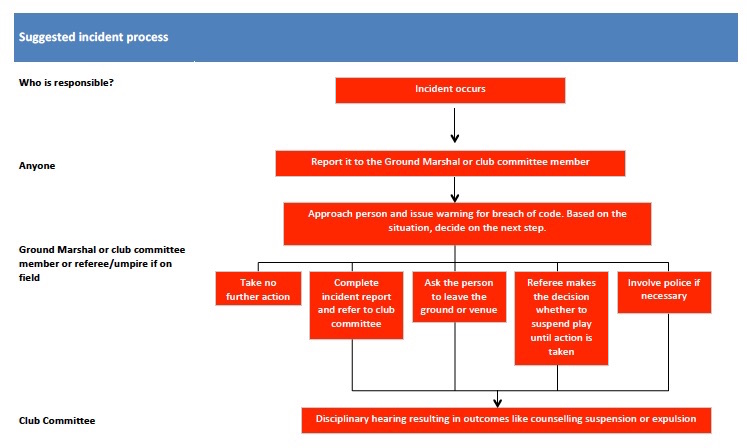
There are many things that club committee's can do to promote positive sporting environments and ensure that conduct and behaviour of members and non-members alike are respectful and appropriate.
Paul Kennedy has a few tips for club committee's -
Implement a Member Protection Policy and Codes of Conduct
All clubs need a Member Protection Policy (MPP). It outlines how your club meets its obligations to provide a safe environment and to maintain responsible behaviour and fair decision-making.
Most national and state/territory sporting bodies have a MPP, which your club and members may be bound by. Check with them first.
Be familiar with your sports MPP, including the committee, key leaders (eg. coaches) and the broader members.
If your sport doesn’t have a MPP, use the Play by the Rules MPP template as a starting point.
One important part of MPP’s are Codes of Conduct – an agree standard of behaviour for everyone in your sport.
Have sound disciplinary procedures
Your club must have procedure for the discipline of members who breach codes of conduct. These may be within your MPP, club constitution or by-laws. Once your club has adopted rules about disciplinary procedures then it is entitled to apply and enforce these rules.
Disciplinary action may involve a simple warning, but it could also include suspension, expulsion or require the person to participate in a counselling session.
If your club does not have disciplinary procedures contained in its rules, it's advisable you seek legal advice as well as speak to your state/territory or national sporting body.
Understand your incident process
With your codes of conduct and disciplinary procedures in place, your club should map out a clear process for dealing with incidents. Establish what the response is – step by step – and who is responsible for each step. You can download our Who is responsible for dealing with an incident information sheet here. Also, download our suggested incident process table below:

Download our suggested incident process table
Allow for non-members
When signing on as members, people must agree to abide and be bound by your club’s rules. However, some people involved in your club activities are not club members and therefore not legally bound by your club’s rules. This might include spectators, officials or parents of visiting teams.
In this case it is important that your club secures the right to enforce its rules over such people by some other means. These can include:
- Applying 'conditions of entry' which specifically provide that entrants to grounds agree to be bound by the rules and policies of your club. This may need to be discussed with the facility owner.
- Requiring parents to agree to be bound by the club's rules. This could be achieved by asking them to sign registration forms at the start of the season.
- Implementing league or association rules which apply equally to home and visiting team players, officials and representatives.
Appoint a Ground Marshal
Club’s could appoint a ground marshal for every game day to prevent and deal with bad behaviour by other officials, players, coaches and spectators. The title of the ground marshal will vary depending on the sport. Club committees can best prepare ground marshals by:
- Providing an info pack including: a job description, club Member Protection Policy and codes of conduct, incident processes
- Providing distinctive clothing - ensure your ground marshals stand out on game day by providing them with something distinctive to wear.
- Provide training - ground officials need the skills and confidence to deal with difficult situations. Have your ground official complete the Play by the Rules Child Protection, Harassment and Complaint Handling training.
- Establish a reporting system - put in place an incident reporting system for ground officials to use.
- Ground marshal's should be familiar with resolving conflict steps to help deal with issues quickly and appropriately. Download our Resolving Conflict Steps for Ground Marshal's.
Training and education
Ensuring people in your club have the skills to deal with poor behaviour and a good understanding of fair play is essential. The free Play by the Rules online training courses are ideal place to refer people to. Consider making them part of your registration or accreditation processes.
Members need to know about your policies and procedures, as well as be continually reminded of acceptable and expected conduct.
Try some of these ideas:
Promote policies and procedures – at registration, inductions, at your venue and/or on your website.
Articles - Publish articles and tips in your newsletter and/or website. Articles could focus on topics like codes of conduct, the ground marshal, fair play and what to do if incidents occur.
Meetings - Think about arranging pre-season meetings between key groups, such as parents and coaches, to discuss club policies, fair play and expectations.
Role models - Arrange for role models from your sport to talk to players, parents and coaches. This can have a huge impact on people, especially young people.
Ground announcements - Play announcements on game/event days that remind people to keep their emotions in check. For example use our Let Kids Be Kids resources.
Positive messages - Communicate simple fair play messages via banners, posters, stickers or animated banners on your club website.
Fair play day - Arrange a fair play day each season to reinforce positive messages. Incorporate the suggestions above into the day.
Good Sport Award - Adopt a Good Sport Award to recognise positive behaviour by teams and individuals.


